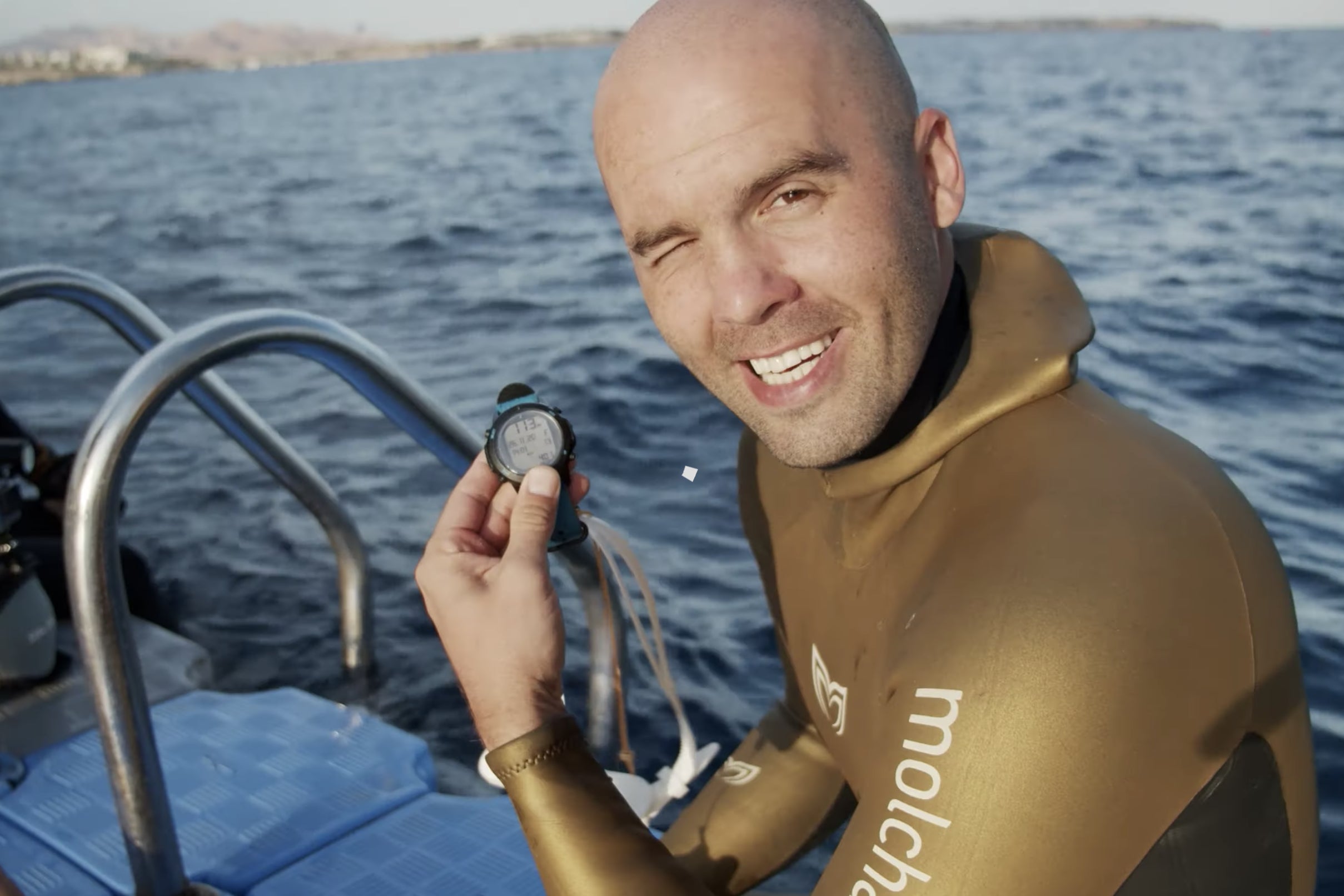Interview with Alexey Molchanov on His 113m CWTB World Record Performance

The sun was shining on November 26, 2020 in Sharm El Sheikh, Egypt, where the AIDA Freediving World Competition - Covid19 Special Edition was being held. The Red Sea water was 26°C (79°F) with 20m+ (66ft+) visibility, no current, and no thermocline at 2:00pm when Alexey Molchanov, multiple freediving World Record holder, made his most recent world record dive. The discipline was Constant Weight with Bifins (CWTB), the line was set at 113m (371ft), and the dive was successful in every way.
Alexey wore his signature gold two-piece custom-made Molchanovs Performance Wetsuit in 1.5mm, gold CB2 bifins with a soft stiffness and with standard size 38-40 foot pockets, gold A6063 nose clip, and Molchanovs Competition Grade Lanyard for his 4:05 dive when he broke the world record, yet again, after his 111m (364ft) dive at the Adriatic Freediving Trophy in Croatia.
I sat down (virtually) with Alexey to discuss his performance, training methodologies, and motivations for this particular record-breaking dive.
Kristina Zvaritch: First of all, let me congratulate you on your excellent dive and new world record! How was the dive itself?
Alexey Molchanov: Thank you! The dive itself felt really solid and I was confident. I like this discipline a lot, the bifins, and I think it has a lot of potential; it’s a new discipline in our sport. We have a lot of fun challenging each other (me, Arnaud, Thibault, Abdullatif, etc.). I feel very strong and confident in this discipline, and I feel very confident that I can keep pushing deeper. The dive was by the book, good in every aspect. I had a lot of support there from friends and students that came to see the competition, and it was awesome to have this type of support.
KZ: That is great to hear! So what exactly goes through your head while you are diving?
AM: With record dives, in your head, you have the perfect dive. You try to be as close as possible to it. You have all the details rehearsed and you want to be as close to the ideal execution of technique, relaxation, and equalization as possible. That’s what’s in my mind.
KZ: Clear visualization, got it! What was your training like for this dive?
AM: I am always able to train and prepare for deep dives even before coming to the sea for an actual dive. I was doing a lot of exercises while I was in Moscow, and competed in national pool championships where I did pretty good results, 250m with bifins. When I arrived, it was three days of preparation and the 4th day was competition day. I dove deep for those three days, and it’s quite a fast adaptation, I would say, and I’m really pleased to do that. I think it’s hugely because of the dry training that I do, the Molchanovs freediving lung exercises, something we develop constantly and something I teach my students.

KZ: I would definitely agree on fast adaptation! I know myself and the rest of the freediving world out there would like to know: what is your routine before diving?
AM: Nothing special before, I just try to go to bed early; it’s important to get good sleep. In the morning, I eat a good breakfast of carbs, 3-4 hours before the dive. Usually it’s oats, some fruits, bananas, but I don’t have a strict routine. If there’s no food available somewhere in the region, I would just as easily find something similar. My stretching involves breathing muscle stretching and diaphragm stretching.
KZ: Okay, so a carb-loaded breakfast, good to know! What is your motivation when you freedive to these deep depths, Alexey?
AM: Well, I ask myself, “How deep can I dive?” And I’m looking for the answer basically. That’s my motivation. When I know I can dive deep, the question is how deep. I ask myself this question in each discipline, which pushes me to act, to train, to prepare, and to dive. My motivation comes from the questions I ask myself. That’s the process I’ve learned from doing sports my whole life: asking powerful questions that push you to achieve things.
KZ: That’s really interesting, thanks for sharing that! Lastly, how has the COVID-19 pandemic affected your training and life this past year?
AM: Training surprisingly improved! Traditional ways of training were limited, pools were closed, and traveling was limited. I was pushed to expand and research new areas of training and developing our Molchanovs freediving lung exercises even further. The efficiency of those exercises improved a lot and I could see the results in my diving immediately after the quarantine was lifted in the summer. Now, with diving in Egypt and being able to progress really fast, I can see that this new type of dry exercises I developed really helped me and really helped my students. That was an interesting outcome of the pandemic, training-wise.
On the personal side, because of the limitations on traveling, I enjoyed having a lot of time to spend with family. I had a lot of time to spend on training, on family, and on business as well. This year was a year of growth because of more focus and less distractions for me; this was a surprisingly good outcome. Sales and teaching dropped for the business, similar to other people, so financially it was a hard period, especially at the beginning of the year. Otherwise, in terms of growth and thinking and structure, it was a very fruitful period.
Click here to watch the video of Alexey’s world record-breaking dive to 113m (371ft).

Leave a comment